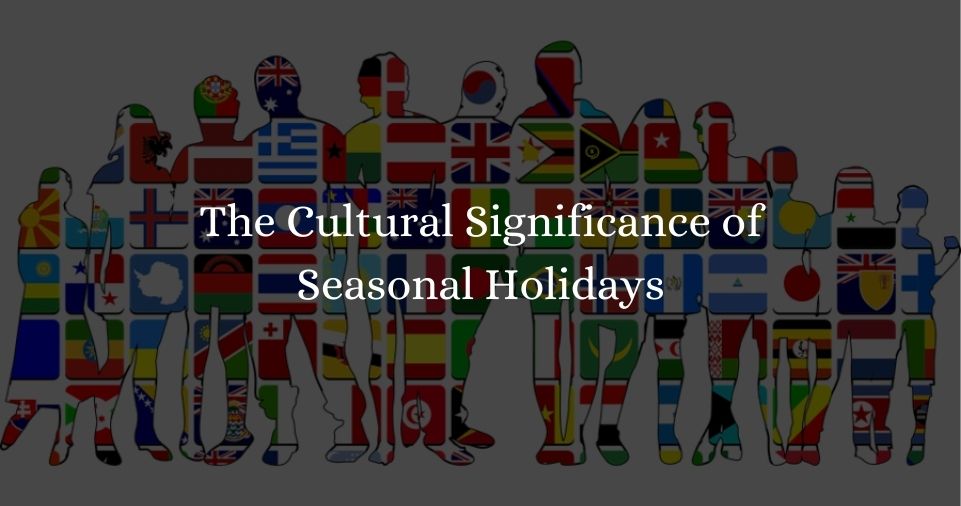What are seasonal holidays? 2023
Have you ever found yourself wondering about the whys and how’s of seasonal holidays? Do you struggle to understand the origins, significance, and cultural nuances that shape these special occasions? If so, you’re not alone. We recognize that the concept of seasonal holidays can be intricate and multifaceted, potentially leading to confusion or misunderstanding. However, worry not. This blog post is designed to demystify the concept of seasonal holidays, presenting you with clear and insightful information.
We promise to provide you with an understanding of what seasonal holidays are, why they’re celebrated, and how they influence our lives and cultures. We’ll delve into the history, evolution, and cultural significance of these occasions. By the end of this article, you’ll not only have a solid understanding of seasonal holidays but also appreciate their role in fostering unity and celebration in diverse communities.
There’s something innately human about marking time with celebrations and remembrances, something that draws us together. Yet, the lack of understanding can make us feel disconnected from these traditions. In addressing this pain point, we aim to enhance your connection with these globally shared times of joy and reflection.
Understanding Seasonal Holidays
Now, let’s embark on a journey to understand what seasonal holidays truly are. These are specific periods, marked in our calendars, that come around the same time each year. Often linked to the changing seasons, these holidays have deep historical roots and reflect a blend of cultural, religious, and societal traditions.
Having the chance to unwrap the historical background of seasonal holidays is a journey like none other. Let’s go back in time to understand the evolution of these holidays. They emerged as celebrations, tied closely to the agricultural cycles and nature’s rhythms. They were pivotal points of the year that allowed our ancestors to track the passage of time. As societies evolved, these became occasions for communal gatherings and festive celebrations, intertwining with religious and cultural narratives.
The Cultural Significance of Seasonal Holidays

Delving deeper into the cultural significance of these holidays, one can truly appreciate their influence on our identities. Seasonal holidays shape our cultural identities in the most beautiful of ways. These holidays are so much more than just days off work; they are a part of our cultural fabric, brimming with rich traditions, customs, and shared experiences. Whether it’s lighting a menorah during Hanukkah, or painting Easter eggs, each seasonal holiday carries with it a unique cultural significance that contributes to our collective identities.
The magic of seasonal holidays doesn’t stop there. They play a crucial role in fostering unity and diversity, a rather intriguing dichotomy. On one hand, these holidays unite us, bringing together families, communities, and even entire nations, around shared traditions and celebrations. The sense of belonging that we feel during these times is a testament to their unifying power.
On the other hand, seasonal holidays serve as a celebration of our diverse cultural tapestry. Each holiday, with its unique traditions and customs, adds to the richness of our cultural mosaic. In a world often divided by differences, these holidays remind us that diversity is something to be celebrated, not shunned.
As we further explore the beauty and significance of seasonal holidays, let us remember to cherish these moments of unity and diversity. They are reminders of our shared history and our colorful cultures. They’re not just dates on a calendar, but rather, they are threads that weave together the tapestry of our collective human experience. Embrace them, for they are part of what makes us who we are.
Seasonal Holidays Around the World
Welcome to the global tour of seasonal holidays, showcasing the vibrant traditions cherished across different cultures. From the vibrant colors of Holi in India to the picturesque lanterns of Chinese New Year, seasonal holidays reflect the heart and soul of each society.
Let’s take a closer look at the unique traditions and customs that add charm to these holidays. In India, the festival of Holi brings a burst of color and laughter to the arrival of spring. In the same season, the Japanese admire the fleeting beauty of cherry blossoms during Hanami. Meanwhile, winter ushers in the warmth of traditions like the German Christmas markets or the stunning Festival of Lights, Diwali, in India.
Also Read: The Best Free Websites You Can Use to Watch Cartoons Online
The Impact of Seasonal Holidays on Society and Economy
While these holidays leave a mark on our hearts, their impact extends much further. There’s an undeniable economic significance of seasonal holidays. From the surge in retail sales during Christmas or Black Friday to the boost in tourism during Chinese New Year, seasonal holidays are significant economic drivers. They stimulate the economy, create jobs, and foster economic growth.
But it’s not just about money. Seasonal holidays also have societal implications. They bring people together, encouraging social interaction and strengthening community ties. These holidays also promote charitable activities and acts of goodwill, infusing our societies with a sense of kindness and compassion.
In the grand scheme of things, seasonal holidays are more than just festive celebrations. They’re the heartbeat of our societies and economies. As we continue to delve into the world of seasonal holidays, let’s remember to value their cultural significance, economic impact, and societal importance. They serve as an enduring symbol of our shared humanity and the beauty of our diverse world.
Conclusion
In this enlightening journey, we’ve explored the wonderful world of seasonal holidays. They’re not just dates marked on a calendar; these holidays carry rich historical significance, reflecting the diverse tapestry of cultures around the globe. They’ve played a part in shaping our cultural identities, fostering unity and diversity, and acting as an economic stimulus.
But more importantly, they’re moments of joy, love, and community. They bring us closer together, making us feel part of something larger than ourselves. Whether you’re splashing vibrant colors during Holi, lighting up lanterns for Chinese New Year, or relishing the warmth of a German Christmas market, remember to embrace the unique beauty of these holidays. Celebrate not just the traditions, but also the unity and diversity they represent. Let seasonal holidays continue to enrich our lives, our cultures, and our shared humanity.
Frequently Asked Questions
1. What are seasonal holidays?
Seasonal holidays are periods of celebration that occur at the same time each year, often associated with the changing seasons. They reflect a blend of cultural, religious, and societal traditions.
2. How do seasonal holidays shape our cultural identities?
Seasonal holidays contribute to our cultural identities through the traditions and customs they carry. They serve as a reflection of our cultural heritage and shared experiences.
3. How do seasonal holidays foster unity and diversity?
Seasonal holidays bring together families, communities, and nations around shared traditions, promoting unity. Meanwhile, they also highlight the unique customs and celebrations of different cultures, fostering diversity.
4. What economic impact do seasonal holidays have?
Seasonal holidays stimulate the economy by boosting retail sales, promoting tourism, and creating jobs. Holidays like Christmas, Black Friday, and Chinese New Year have significant economic impacts.
5. What societal implications do seasonal holidays carry?
Seasonal holidays encourage social interaction and strengthen community ties. They also promote charitable activities and acts of goodwill, infusing our societies with a sense of kindness and compassion.






